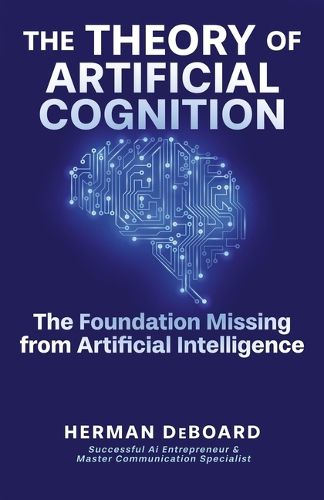Readings Newsletter
Become a Readings Member to make your shopping experience even easier.
Sign in or sign up for free!
You’re not far away from qualifying for FREE standard shipping within Australia
You’ve qualified for FREE standard shipping within Australia
The cart is loading…






"The Theory of Artificial Cognition" explores the critical relationship between artificial intelligence (AI) and cognition, arguing that true intelligence cannot exist without the foundational elements of cognitive processes. The book posits that while current AI systems exhibit remarkable capabilities, they lack the essential dimensions of human-like cognition--such as thought processes, emotional understanding, and experiential learning--limiting their effectiveness and adaptability. Through an interdisciplinary approach, the book delves into the historical context of AI, examines the implications of emerging technologies like quantum computing and brain-computer interfaces, and highlights the importance of ethical considerations in AI development. It emphasizes the need for collaboration among researchers, developers, and ethicists to integrate cognitive principles into AI design, ensuring that intelligent systems enhance human experiences rather than replace them.
The book also challenges readers to rethink traditional definitions of intelligence, encouraging a nuanced understanding that encompasses both human and artificial forms. By addressing the limitations of current AI and advocating for the incorporation of cognitive principles, "The Theory of Artificial Cognition" presents a compelling case for the responsible development of AI technologies that reflect the complexities of human cognition, ultimately aiming to create systems that are more effective, ethical, and aligned with human values.
$9.00 standard shipping within Australia
FREE standard shipping within Australia for orders over $100.00
Express & International shipping calculated at checkout
"The Theory of Artificial Cognition" explores the critical relationship between artificial intelligence (AI) and cognition, arguing that true intelligence cannot exist without the foundational elements of cognitive processes. The book posits that while current AI systems exhibit remarkable capabilities, they lack the essential dimensions of human-like cognition--such as thought processes, emotional understanding, and experiential learning--limiting their effectiveness and adaptability. Through an interdisciplinary approach, the book delves into the historical context of AI, examines the implications of emerging technologies like quantum computing and brain-computer interfaces, and highlights the importance of ethical considerations in AI development. It emphasizes the need for collaboration among researchers, developers, and ethicists to integrate cognitive principles into AI design, ensuring that intelligent systems enhance human experiences rather than replace them.
The book also challenges readers to rethink traditional definitions of intelligence, encouraging a nuanced understanding that encompasses both human and artificial forms. By addressing the limitations of current AI and advocating for the incorporation of cognitive principles, "The Theory of Artificial Cognition" presents a compelling case for the responsible development of AI technologies that reflect the complexities of human cognition, ultimately aiming to create systems that are more effective, ethical, and aligned with human values.